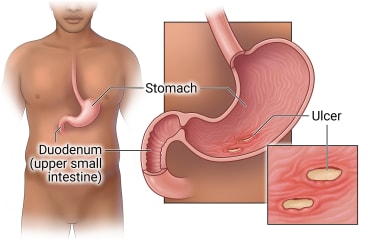Overview

Peptic ulcers are sores on the inside of the stomach. Or they may be on the inside of the small intestine (such as a duodenal ulcer). They are most often caused by an infection with Helicobacter pylori (H. pylori) bacteria or use of nonsteroidal anti-inflammatory drugs (NSAIDs). NSAIDs include aspirin, ibuprofen (Advil or Motrin), and naproxen (Aleve).
Your doctor may have prescribed medicine to reduce stomach acid. You also may need to take antibiotics if your peptic ulcers are caused by an infection. You can help yourself heal and help keep ulcers from coming back. You can do this by making some changes in your lifestyle. Avoid smoking and alcohol. Ask your doctor if you need help quitting or cutting back.
Follow-up care is a key part of your treatment and safety. Be sure to make and go to all appointments, and call your doctor if you are having problems. It's also a good idea to know your test results and keep a list of the medicines you take.
How can you care for yourself at home?
- Be safe with medicines. Take your medicines exactly as prescribed. Call your doctor if you think you are having a problem with your medicine.
- Do not take aspirin or other NSAIDs such as ibuprofen (Advil or Motrin) or naproxen (Aleve). Ask your doctor what you can take for pain.
- If you smoke, try to quit. Smoking can make ulcers worse. If you need help quitting, talk to your doctor about stop-smoking programs and medicines. These can increase your chances of quitting for good.
- Avoid drinking alcohol as much as you can.
- Eat a balanced diet of small, frequent meals. See a dietitian if you need help planning your meals. Avoid foods that make your symptoms worse.
When should you call for help?
Call 911 anytime you think you may need emergency care. For example, call if:
- You have symptoms of a heart attack. These may include:
- Chest pain or pressure, or a strange feeling in the chest.
- Sweating.
- Shortness of breath.
- Nausea or vomiting.
- Pain, pressure, or a strange feeling in the back, neck, jaw, or upper belly or in one or both shoulders or arms.
- Lightheadedness or sudden weakness.
- A fast or irregular heartbeat.
- You have sudden, severe, continuous belly pain and vomiting.
- You vomit bright red blood or what looks like coffee grounds.
- You pass maroon or very bloody stools.
Call your doctor now or seek immediate medical care if:
- You have new or worse belly pain.
- Your stools are black and look like tar, or they have streaks of blood.
- You vomit.
Watch closely for changes in your health, and be sure to contact your doctor if:
- You do not get better as expected.
Where can you learn more?
Go to http://www.healthwise.net/patientEd
Enter Z086 in the search box to learn more about "Peptic Ulcer Disease: Care Instructions".
Current as of: October 19, 2024
Author: Ignite Healthwise, LLC Staff
Clinical Review Board
All Ignite Healthwise, LLC education is reviewed by a team that includes physicians, nurses, advanced practitioners, registered dieticians, and other healthcare professionals.

